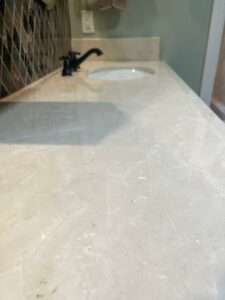Marble Countertop Care
Marble Countertop Care
Stone countertops possess a timeless charm and durability, making them a sought-after choice among homeowners.
However, these surfaces can lose their luster, become stained, or incur damage over time without proper care.
Investing in JK Marble Countertop Care Services is essential to maintaining their beauty and ensuring a lasting investment.
Our comprehensive offerings include restoration, polishing, sealing, and repair.
Customer Testimonial:
“After years of wear and tear, our kitchen’s marble countertops had lost their shine and had several noticeable stains.
We turned to JK Marble Countertop Care Services for help, and the transformation was incredible.
Not only did they restore the countertops’ original shine, but they also sealed them to protect against future damage.
We couldn’t be happier with the results!” – Emily R., Pasadena, CA
Stone Countertop Restoration
Restoring marble countertops involves bringing back their original shine and luster.
This process typically starts with thoroughly cleaning to remove dirt, grime, and stains.
JKMM can evaluate the condition of your marble and recommend the best course of action for restoration.
This may involve using specialized equipment and products to remove etching, scratches, or other surface imperfections.
Polishing Marble Countertops
Polishing is essential to marble countertop care, as it helps maintain the surface’s shine and smoothness. Our polishing services use diamond abrasives, powders, or polishing compounds to create a high-gloss finish.
This process enhances the marble’s appearance and makes it more resistant to wear and tear.
Regular polishing can help prevent the need for more extensive restoration work.
Sealing Marble Counters
Marble is porous and can absorb liquids, leading to stains.
Sealing your marble countertops is crucial for protecting them.
A high-quality sealer fills the marble’s pores, creating a barrier against stains and etching.
Case Study:
The Andersons were frequent entertainers, but their love for hosting was leaving marks on their marble countertops.
After JK Marble Maintenance sealed their surfaces, spills from wine nights and cooking sessions were no longer a concern, preserving the beauty and integrity of their marble for years to come.
Repair of Marble Countertops
Even with proper care, marble countertops can become damaged.
Common issues include chips, cracks, and broken edges.
In such cases, a professional marble repair service can restore your countertops to their former glory.
Repair techniques may involve filling in chips or cracks with color-matched epoxy or using specialized tools to smooth out rough or uneven areas. In some cases, more extensive repairs or replacements may be necessary.
Stain Removal
https://es3f2v8ai9d.exactdn.com/wp-content/uploads/2021/01/Janet-video.mov

Spills from coffee, wine, fruit juices, and sauces can penetrate your marble countertop, leaving ugly stains.
If the stain has already penetrated beneath the countertop’s surface, wiping will not remove it.
We can help remove the stains on your marble countertop within a few minutes or hours, depending on the extent of the color.
If the stain has already penetrated the deeper layers of the marble, then we can remove it using a method known as a poultice.
If the poultice fails to remove the stain, we can grind the affected area of your marble countertop and then polish it back to its original finish.
The stain removal method we will apply will depend on the nature and extent of the stain.
Sand Out Scratches From Marble
As noted above, marble comes with a soft, porous surface.
So, apart from absorbing stains, it can also be easily scratched.
These scratches usually happen when you chop vegetables or meat directly on the marble countertop.
Scratches will also occur if you drag or slide appliances on the countertop.
JK Marble can remove scratches and other imperfections from your marble countertops.
Our scratch removal process involves polishing the marble countertop with high-grit or medium-grit industrial diamond pads.
After grinding the surface using the appropriate tool, we will apply the polishing paste, restoring your marble countertops to their original shine.
Remove Etch Marks From Countertops
As part of marble countertop care, we provide information about how and why marble countertops are etched. Acidic substances like lemon juice, caustic soda, ketchup, fruit juice, and vinegar can etch marble countertops, leaving white or dull spots.
The problem is ordinary cleaning products can’t remove the etched stains.
That’s why it’s advisable to consult marble countertop restoration professionals like JK Marble.
Our etch removal process has three main steps. First, we will remove the dirt and grime on the surface of your marble countertops using a stone cleaner.
We will then rinse the surface thoroughly to remove all the residue.
Second, we will polish the marble using marble polishing powder until all the etched stains have disappeared.
Your marble countertop will also look shiny at this stage.
Third, we will rinse the marble surface using clean water and then buff it dry using a soft fiber cloth.
Customer Testimonial:
“I accidentally left a lemon slice on my marble countertop overnight, resulting in a noticeable etch mark.
I was horrified.
JK Marble’s team removed the etch mark and educated me on how to prevent future damage.
Their expertise and customer service were outstanding.” – Greg D., San Marino, CA.
Fill Chips On Marble Countertops
Chips can also occur on the edges of your marble countertops.
Regardless of the extent of the chipping, we can help you repair them and give your marble countertops a better look.
We repair chipped marble countertops using kitchen-grade or food-grade epoxy.
We will also mix epoxy with various color pigments to ensure it matches the existing color and pattern.
Repairing chipped marble countertops is a sensitive task that requires a specific set of tools and supplies.
While doing it yourself may save you money, you may further damage your marble countertops.
So, let the marble countertop restoration experts at JK Marble do the job, and you can rest assured that you will get value for your money.
Repair Cracks On Marble Countertops
Marble countertops can crack when subjected to hard impacts.
For instance, sitting on a countertop overhang or bumping its corners with heavy furniture may be enough to crack the slab.

Replacing your marble countertop may appear as the best option when your marble countertop cracks.
So, what happens when you don’t have enough money to replace the entire countertop?
We can repair a cracked marble countertop, so you don’t have to replace the entire piece.
We can repair and fix hairline cracks, splitting apart, or deep breakages in marble countertops. Our repair method will depend on the size of the damage.
Contact Us Today
Whether your marble countertop is stained, etched, cracked, chipped, or damaged, JKMM has the skills, experience, and tools to restore it.
Contact us today for any marble countertop restoration services, and rest assured of value for your money.
For more insights and customer stories on how we’ve transformed marble countertops, visit our website or call us at 818 984-1195. Let us help you maintain the beauty and durability of your marble surfaces.
